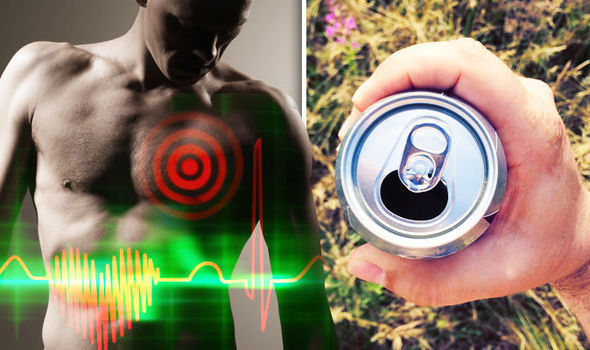Do you fantasize the idea of drinking energy drinks? Or are you a regular consumer of energy drinks? If yes, then behold!
Maybe a look at this case will change your perception!
As advertised, energy drinks are thought to give us a jolt of lightning, power of a bull or strength of the horses. Do we know what else can the energy drinks give, if taken excessively?
A HEART ATTACK!
This case is proof. A 26-year-old, previously healthy man, resident of Texas with a daily habit of consuming energy drinks, suffered a heart attack. According to the report, he was brought to the emergency room nine hours after the onset of chest pain (angina) along with profuse sweating and numbness in the left arm. He had one episode of vomiting before arriving at the hospital.
According to the history given by the patient, he took eight to ten energy drinks the day he suffered a heart attack, but that wasn’t unusual for him. He was habitual of gulping down these many drinks. Also, he has been smoking cigarettes for the past two years.
In this case, regular and excessive intake of energy drinks was considered as a potential cause behind his heart attack due to its higher caffeine content compared with other caffeinated beverages. This with other harmful ingredients may have resulted in the formation of a blood clot which blocked his coronary artery.
The young man was given adequate and timely treatment; also he was counselled to quit smoking and consumption of energy drink. He made a complete recovery and was discharged two days later.
Energy drinks are fashion drinks, particularly among youth and children. Most are unaware of the contents in a single serving of these drinks. As energy drinks are unregulated, the ingredients remain unapproved and uncontrolled by the FDA. Therefore, stimulants used in these drinks to boost up the energy can have adverse effects on the vessels of the heart. This is not just a statement; a study from the University of Texas Health Science Center has supported these claims. Blood vessels were seen to get narrower every time with an intake of the energy drinks. Narrower vessels lead to the inadequate blood supply to the heart.
Another research in 2017 showed that energy drinks have a profound effect on the heart’s activity, i.e. QT/QTc interval is prolonged, and systolic blood pressure rises due to effects imparted by the energy drinks. A study was conducted in 2016 to evaluate the impact of energy drinks on blood pressure, which showed adverse effects on the pressures. Such drinks increase blood pressure, consequently increasing the risks of cerebrovascular accidents (stroke) and myocardial infarction (heart attack).
What is in the energy drink that carries the burden of so many adverse effects?
Well, many advocates and lovers of energy drink might want to debate the adverse effects so they might ask this legitimate question. Unfortunately, no one compound has been pointed out as the culprit. Researchers think the side effects are due to the combination of ingredients. Some of which may react with the gut bacteria to form a compound called trimethylene N-oxide TMAO which plays a crucial role in the happening of the ischemic events (heart attacks and strokes).

Food for thought:
What can be the alternative of energy drinks if we want to boost energy?
Sleep well, eat a balanced diet with lots of fruits and vegetables, exercise, lessen your stress, meditate, and drink an adequate amount of water. Still, if you need a booster, try caffeine in a moderate amount as coffee or tea.
References:
Energy Drinks Quickly Affect the Heart. (2019, July 21). Retrieved from CardioSmart American College of Cardiology: https://www.cardiosmart.org/News-and-Events/2019/06/Energy-Drinks-Quickly-Affect-the-Heart
John P. Higgins, M. M. (2018, November 12). Just one energy drink may hurt blood vessel function. Retrieved from Newsroom: https://newsroom.heart.org/news/just-one-energy-drink-may-hurt-blood-vessel-function?preview=dae5
Sachin A. Shah, A. H. (2019, May 29). Impact of High Volume Energy Drink Consumption on Electrocardiographic and Blood Pressure Parameters: A Randomized Trial. Retrieved from Journal of the American Heart Association.: https://www.ahajournals.org/doi/full/10.1161/JAHA.118.011318
Mangi, M. A., Rehman, H., Rafique, M., & Illovsky, M. (2017). Energy Drinks and the Risk of Cardiovascular Disease: A Review of Current Literature. Cureus, 9(6), e1322. https://doi.org/10.7759/cureus.1322
Higgins, JP, Tuttle, TD, Higgins, CL. Energy beverages: content and safety. Mayo Clin Proc. 2010;85:1033-1041. https://www.ncbi.nlm.nih.gov/pubmed/21037046?dopt=Abstract
Reissig, CJ, Strain, EC, Griffiths, RR. Caffeinated energy drinks: a growing problem. Drug Alcohol Depend. 2009;99(1-3):1-10.https://www.ncbi.nlm.nih.gov/pubmed/18809264?dopt=Abstract




